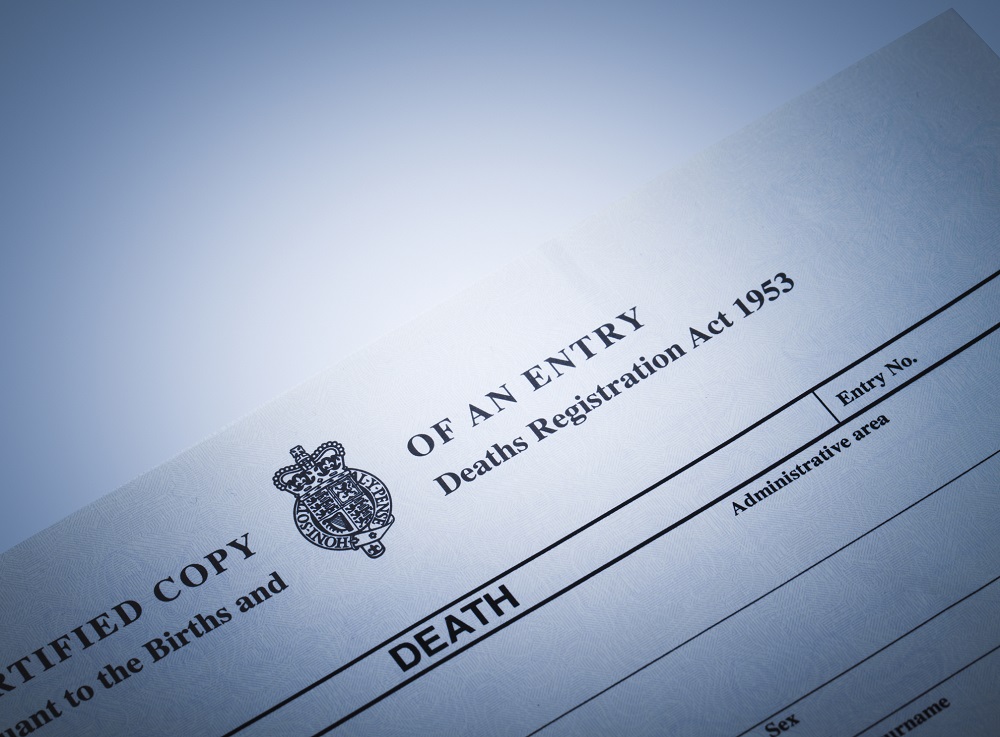How many death certificates do you need when someone dies?
When someone dies, you may need to send a death certificate to close their accounts and prove the death. But how many death certificates will you need? Michael Brook, a solicitor in Lodders’ private client practice, explains what you need to consider.

How do you get a death certificate when someone dies?
Before deciding how many death certificates you’ll need when someone dies, you need to follow a set step-by-step process to get the death registered.
When someone dies, the first step is to collect the medical certificate of death - an official medical record confirming the cause of death. It should be noted that the medical certificate of death and the death certificate are different, and you need one to be able to obtain the other.
To get the medical certificate of death, you may need to travel to the local GP surgery, care home or hospital to get this from the relevant medical professional. Once you have the medical certificate of death, you will need to make an appointment on the government website to register the death.
You should register the death within five days (eight days in Scotland), including weekends and bank holidays. Traditionally, the registration was usually done in person at the local registry office. However, due to the coronavirus (COVID-19) pandemic, registrations are now carried out verbally via a telephone appointment with the registrar.
How many death certificates will you need when someone dies?
When you come to registering the death (whether over the phone or in person), the registrar will ask how many death certificates you want. There is no easy answer to how many death certificates you’ll need when someone dies, but it is recommended that you get a minimum of two.
The actual number of death certificates you need will depends on who is dealing with the deceased’s ‘estate’ (money, property and possessions):
- If a solicitor is dealing with the estate, they will only need one original death certificate (in addition to the one that you keep, hence the two death certificates minimum recommended), as they are able to produce a ‘Death Certificate Verification Form’, which is a widely accepted copy.
- If you are dealing with the estate, you may need more death certificates, as you are not allowed to copy the death certificate using a printer or photocopier. In fact, it is illegal to copy a death certificate. You may well need between five to 10 death certificates if the person who has died held assets with several different financial institutions. It’s therefore a good idea to create a list of all bank and building society accounts, investment plans and shares to help identify the total number of certificates you will need to provide.
Should you need them, you can always order extra copies of a death certificate later. However, this can take time, so it is easier to make sure you have enough copies to start with and request them when the process begins. Death certificates currently cost £11.
Who will need a death certificate when someone dies?
There are various individuals and organisations who will typically want to see a death certificate when someone dies, including:
- solicitors
- banks
- pension companies
- share registrars
- investment holders
- credit companies
Many organisations will return death certificates to you once they have noted them in their records, but not all do, and they may not return them quickly. There is also the risk of death certificates going missing in the post, so it’s always important keep at least one copy of the original death certificate in case others get lost.
Remember that solicitors are there to assist you and have experience of the procedures and requirements. Feeling overwhelmed by the process when someone dies is perfectly normal, so getting professional help is always recommended.

About the author
Michael Brook is a solicitor in the Private Client team at Lodders Solicitors and advises clients on wills, probate and private client related land matters. He also works alongside the firm’s specialist care and capacity team advising on powers of attorney, deputyship orders and vulnerable clients.
See also
What to do after someone dies: a checklist
What is the Tell Us Once service when someone dies?
How to value a house and its contents for probate
Place a Deceased Estates notice
What are the responsibilities of an executor?
Find out more
Register the death (GOV.UK)
Order a copy of a birth, death or marriage certificate (GOV.UK)
Find a register office (GOV.UK)
Image: Getty Images
Publication date: 25 June 2020
Any opinion expressed in this article is that of the author and the author alone, and does not necessarily represent that of The Gazette.
